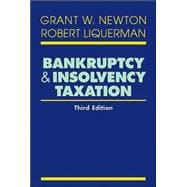
What is included with this book?
Robert Liquerman is a principal in KPMG LLP’s Washington National Tax Practice, Corporate Tax Group, specializing in matters under Subchapter C of the Internal Revenue Code. He is an adjunct professor of law in the LL.M. program at the Georgetown University Law Center and previously served as an adjunct professor in the LL.M. program at The College of William & Mary, Marshall-Wythe School of Law. Mr. Liquerman holds an LL.M. in Taxation from New York University School of Law; a J.D. from St. John’s University, School of Law; and a B.S. in Accounting from the State University of New York at Binghamton.
He joined KPMG LLP from the Internal Revenue Service Office of the Chief Counsel, Corporate Division. In this position, he drafted treasury regulations, private letter rulings, technical advice memoranda, closing agreements, responses to congressional inquiries, field service advice, and memoranda of law. Prior to his government experience, Mr. Liquerman was a senior tax associate in the mergers and acquisition group and the insurance group in the New York office of Coopers & Lybrand.
He is a frequent speaker on bankruptcy and tax issues at various tax institutes and conferences around the country, including Tax Executives Institute, Federal Bar Association, DC Bar Association, and the Association of Insolvency and Restructuring Accountants. Mr. Liquerman is a member of the American Bar Association, Section of Taxation.
Although Chapters 2, 5, 6, and 7 reflect the views of Robert Liquerman, they do not necessarily reflect the views of KPMG, LLP.
|
|||
|
|||
|
|||
|
|||
|
|||
|
|||
|
|||
|
|||
|
|||
|
|||
|
|||
|
|||
|
|||
|
|||
|
|||
|
|||
|
|||
|
|||
|
|||
|
|||
|
|||
|
|||
|
|||
|
|||
|
|||
|
|||
|
|||
|
|||
|
|||
|
|||
|
|||
|
|||
|
|||
|
|||
|
|||
|
|||
|
|||
|
|||
|
|||
|
|||
|
|||
|
|||
|
|||
|
|||
|
|||
|
|||
|
|||
|
|||
|
|||
|
|||
|
|||
|
|||
|
|||
|
|||
|
|||
|
|||
|
|||
|
|||
|
|||
|
|||
|
|||
|
|||
|
|||
|
|||
|
|||
|
|||
|
|||
|
|||
|
|||
|
|||
|
|||
|
|||
|
|||
|
|||
|
|||
|
|||
|
|||
|
|||
|
|||
|
|||
|
|||
|
|||
|
|||
|
|||
|
|||
|
|||
|
|||
|
|||
|
|||
|
|||
|
|||
|
|||
|
|||
The New copy of this book will include any supplemental materials advertised. Please check the title of the book to determine if it should include any access cards, study guides, lab manuals, CDs, etc.
The Used, Rental and eBook copies of this book are not guaranteed to include any supplemental materials. Typically, only the book itself is included. This is true even if the title states it includes any access cards, study guides, lab manuals, CDs, etc.